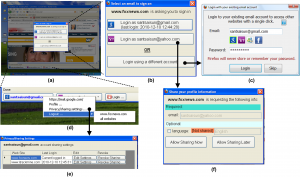OpenID is an open and promising Web single sign-on (SSO) solution. The research led by my Ph.D. student San-Tsai Sun investigates the challenges and concerns web users face when using OpenID for authentication, and identifies what changes in the login flow could improve the users’ experience and adoption incentives. We found our participants had several behaviors, concerns, and misconceptions that hinder the OpenID adoption process: (1) their existing password management strategies reduce the perceived usefulness of SSO; (2) many (26%) expressed concerns with single-point-of-failure related issues; (3) most (71%) held the incorrect belief that the OpenID credentials are being given to the content providers; (4) half exhibited an inability to distinguish a fake Google login form, even when prompted; (5) many (40%) were hesitant to consent to the release of their personal profile information; and (6) many (36%) expressed concern with the use of SSO on websites that contain valuable personal information or, conversely, are not trustworthy. We also found that with an improved affordance and privacy control, more than 60% of study participants would use Web SSO solutions on the websites they trust.

-
LERSSE founder and director
Professor, Ph.D., P.Eng.
Electrical and Computer Engineering
University of British Columbia see you at …
-
latest news
- The intricate web of trust, privacy and safety factors shape users’ experiences on Facebook Marketplace
- Serving on ACM CHI ’24 PC
- Serving on USENIX Security ’24 PC
- Netflix Implements Our Recommendations to Support Profile Transfer
- What Affected the Adoption of Information Tracking Solutions During COVID-19 Pandemic
research interests (tag cloud)
business factors in security COVID-19 cryptocurrencies distributed systems security enterprise security human factos in security Internet voting IT security management malware mental models of security mobile security and privacy other services to the community social networks security Uncategorized usable security web security web single sign onmisc
 recent papers
recent papers- Users’ Expectations, Experiences, and Concerns With COVID Alert, an Exposure-Notification App November 1, 2022
- Neither Access nor Control: A Longitudinal Investigation of the Efficacy of User Access-Control Solutions on Smartphones June 22, 2022
- Users' Perceptions of Chrome's Compromised Credential Notification June 17, 2022
- SoK: The Dual Nature of Technology in Sexual Abuse May 2, 2022
- COVID-19 Information-Tracking Solutions: A Qualitative Investigation of the Factors Influencing People’s Adoption Intention March 11, 2022
- Challenges and Threats of Mass Telecommuting: A Qualitative Study of Workers September 30, 2021
- What Makes Security-Related Code Examples Different September 7, 2021
- SoK: Human, Organizational, and Technological Dimensions of Developers’ Challenges in Engineering Secure Software September 7, 2021
- Non-Adoption Of Crypto-Assets: Exploring The Role Of Trust, Self-Efficacy, And Risk June 4, 2021
- Security Notifications in Static Analysis Tools: Developers’ Attitudes, Comprehension, and Ability to Act on Them April 9, 2021
Konstantin (Kosta) Beznosov · Professional
Proudly powered by WordPress
·
Theme: Pilcrow by Automattic.

